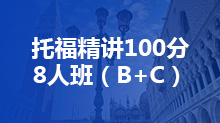If you decide to travel to one of two places and you don’t know which one to visit, which of the following two ways do you think can better help you make the decision?
1) Doing research on the place online;
2) Discussing them with a friend who have been to both of the two places.
【 Introduction 】
When people cannot choose between two travel destinations, many of them immediately hop on [习语性的表达] the Internet for others visitors’ comments and advice. The Internet may offer many ideas, and sometimes, there may be too many, and none of those ideas could compare favorably with [“比xx好”] advice from friends who have been to both places.
【 Body 】
First, there is no denying that travel logs [“旅游日志”] or memories on the Internet are numerous, catering for [cater for] people’s need for abundant [“丰富的”]information that somehow gives people some sense of security, and if these opinions are on different sides, a travel planner feels safer, most likely because they would be otherwise skeptical [“持怀疑态度的”] about the authenticity of information. However, can the diversity be counterproductive [“反作用的”]? Supposedly, the various opinions show a full picture of [习语性的表达] the destinations that inform a viewer of both advantages and disadvantages [inform sb of sth]; they however often cause chaos [“混乱”,名词]. When the viewer is confused by [confuse] the acclaim [“表扬、称赞”,名词] and criticism, hardly can he or she make the right decision or make a final decision. This is when the traveler should turn to a friend who has been to the two places. As a matter of fact, the traveler should turn to the friend in the first place. Although the friend could offer only one idea, which seems too few, the idea is at least consistent, simplifying the decision-making. 【这个段落主要依靠explanation来展开讨论】
Also, a traveler, listening to a friend, does not need to think much, since the friend must be sincerer and more trustworthy than the strangers on the Internet. The friend’s idea may be more admissible [“可被采信的”] or the recommendation may be more adoptable [“可被采用的”]. On the Internet, with their real identity hidden, numerous advertisers disguise [“伪装”,动词] as travelers. Once those fakers’ deceptive [“欺骗性的”] likes and dislikes [“好恶”] , the bait [“诱骗人的东西”] to be taken, are not detected, it all depends on a traveler’s luck to make the right choice of destination. 【然后,可以用例子(exemplification)拓展,此处略】
【 Conclusion 】
In conclusion, the Internet may not be where a traveler finds proper suggestions. Instead, when a travel destination needs to be chosen between twocandidates [“候选人”,“备选项”的修辞性的说法], a friend who has visited both places should be sought.
更多托福考试干货敬请关注新航道托福考试频道




